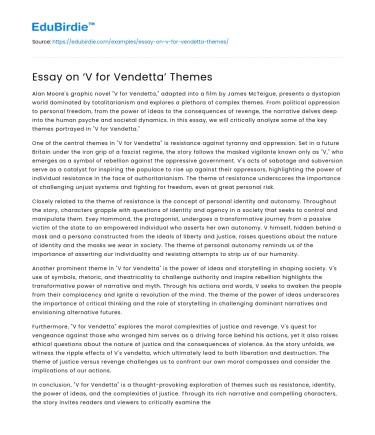Alan Moore's graphic novel "V for Vendetta," adapted into a film by James McTeigue, presents a dystopian world dominated by totalitarianism and explores a plethora of complex themes. From political oppression to personal freedom, from the power of ideas to the consequences of revenge, the narrative delves deep into the human psyche and societal dynamics. In this essay, we will critically analyze some of the key themes portrayed in "V for Vendetta."
One of the central themes in "V for Vendetta" is resistance against tyranny and oppression. Set in a future Britain under the iron grip of a fascist regime, the story follows the masked vigilante known only as "V," who emerges as a symbol of rebellion against the oppressive government. V's acts of sabotage and subversion serve as a catalyst for inspiring the populace to rise up against their oppressors, highlighting the power of individual resistance in the face of authoritarianism. The theme of resistance underscores the importance of challenging unjust systems and fighting for freedom, even at great personal risk.
Save your time!
We can take care of your essay
- Proper editing and formatting
- Free revision, title page, and bibliography
- Flexible prices and money-back guarantee
Closely related to the theme of resistance is the concept of personal identity and autonomy. Throughout the story, characters grapple with questions of identity and agency in a society that seeks to control and manipulate them. Evey Hammond, the protagonist, undergoes a transformative journey from a passive victim of the state to an empowered individual who asserts her own autonomy. V himself, hidden behind a mask and a persona constructed from the ideals of liberty and justice, raises questions about the nature of identity and the masks we wear in society. The theme of personal autonomy reminds us of the importance of asserting our individuality and resisting attempts to strip us of our humanity.
Another prominent theme in "V for Vendetta" is the power of ideas and storytelling in shaping society. V's use of symbols, rhetoric, and theatricality to challenge authority and inspire rebellion highlights the transformative power of narrative and myth. Through his actions and words, V seeks to awaken the people from their complacency and ignite a revolution of the mind. The theme of the power of ideas underscores the importance of critical thinking and the role of storytelling in challenging dominant narratives and envisioning alternative futures.
Furthermore, "V for Vendetta" explores the moral complexities of justice and revenge. V's quest for vengeance against those who wronged him serves as a driving force behind his actions, yet it also raises ethical questions about the nature of justice and the consequences of violence. As the story unfolds, we witness the ripple effects of V's vendetta, which ultimately lead to both liberation and destruction. The theme of justice versus revenge challenges us to confront our own moral compasses and consider the implications of our actions.
In conclusion, "V for Vendetta" is a thought-provoking exploration of themes such as resistance, identity, the power of ideas, and the complexities of justice. Through its rich narrative and compelling characters, the story invites readers and viewers to critically examine the world around them and contemplate the enduring struggle for freedom and dignity. As we navigate our own societies, the themes presented in "V for Vendetta" serve as a poignant reminder of the ongoing fight against tyranny and the importance of upholding principles of justice and autonomy.






 Stuck on your essay?
Stuck on your essay?

